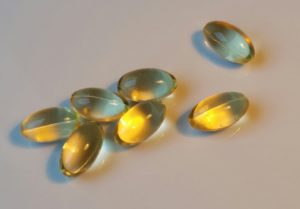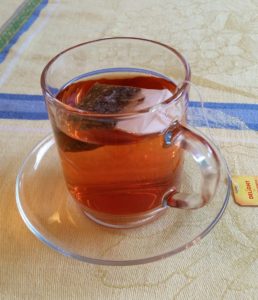
Many people suffer from intestinal ailments, such as intestinal bowel diseases and intestinal bowel syndrome. Over and over researchers find that altered gut microbiomes and intestinal lining alterations (e.g., "leaky gut") may be involved. A recent study from MIT found that the amino acid cysteine promotes healing of the small intestinal lining.
Once again, a person's diet may be the answer. Cysteine is found in many high-protein foods. Foods that are rich in cysteine include: poultry, eggs, beef, fish (e.g., salmon, halibut, tuna), whole grains, soybeans, and some nuts (almonds).
While the study was conducted in mice, the researchers felt the results also applied to humans.
From Medical Xpress: A cysteine-rich diet may promote regeneration of the intestinal lining
A diet rich in the amino acid cysteine may have rejuvenating effects in the small intestine, according to a new study from MIT. This amino acid, the researchers discovered, can turn on an immune signaling pathway that helps stem cells to regrow new intestinal tissue.
This enhanced regeneration may help to heal injuries from radiation, which often occur in patients undergoing radiation therapy for cancer. The research was conducted in mice, but if future research shows similar results in humans, then delivering elevated quantities of cysteine, through diet or supplements, could offer a new strategy to help damaged tissue heal faster, the researchers say. ...continue reading "Healing the Small Intestine and the Amino Acid Cysteine"

 For years the medical advice has been that when taking vitamin D supplements, make sure it is the vitamin D3 form and not vitamin D2. The reasons given are that vitamin D3 is absorbed better and has more health benefits. A recent
For years the medical advice has been that when taking vitamin D supplements, make sure it is the vitamin D3 form and not vitamin D2. The reasons given are that vitamin D3 is absorbed better and has more health benefits. A recent 
 The Mediterranean diet is rich in fruits, vegetables, whole grains, seeds, nuts, legumes, fish, and olive oil. In the study's Mediterranean diet group, the participants were not only given nutritional advice, but also a weekly provision of extra virgin olive oil. This diet is anti-inflammatory, which is why it may be so beneficial to those with psoriasis.
The Mediterranean diet is rich in fruits, vegetables, whole grains, seeds, nuts, legumes, fish, and olive oil. In the study's Mediterranean diet group, the participants were not only given nutritional advice, but also a weekly provision of extra virgin olive oil. This diet is anti-inflammatory, which is why it may be so beneficial to those with psoriasis. The evidence keeps piling up that certain foods are associated with health, while other foods (e.g., soda, ultra processed foods) are associated with chronic diseases. A recent article reported the results of
The evidence keeps piling up that certain foods are associated with health, while other foods (e.g., soda, ultra processed foods) are associated with chronic diseases. A recent article reported the results of  There is strong evidence certain plant compounds (flavan-3-ols, also known as flavanols or catechins) in these foods have beneficial effects on cardiovascular health. These compounds can lower blood pressure and improve endothelial function (functioning of the blood vessels). Two to three cups of tea daily! One to two servings of dark chocolate daily! Instead of chips for a snack, have an apple.
There is strong evidence certain plant compounds (flavan-3-ols, also known as flavanols or catechins) in these foods have beneficial effects on cardiovascular health. These compounds can lower blood pressure and improve endothelial function (functioning of the blood vessels). Two to three cups of tea daily! One to two servings of dark chocolate daily! Instead of chips for a snack, have an apple.

 Millions of pounds of pesticides are used each year in the US: on farms, in buildings and homes, on lawns, in pet flea and tick products - basically everywhere. And so the pesticides eventually wind up in us - from the foods we eat, the water we drink, the air we breathe (when pesticides drift during applications or when used indoors), and the treated lawns and ground we walk on.
Millions of pounds of pesticides are used each year in the US: on farms, in buildings and homes, on lawns, in pet flea and tick products - basically everywhere. And so the pesticides eventually wind up in us - from the foods we eat, the water we drink, the air we breathe (when pesticides drift during applications or when used indoors), and the treated lawns and ground we walk on. Many of us absolutely desire and need a caffeine containing beverage such as coffee or tea in the morning, and find it difficult to function without it. So, findings from a recent
Many of us absolutely desire and need a caffeine containing beverage such as coffee or tea in the morning, and find it difficult to function without it. So, findings from a recent  Weight loss drugs (e.g., Ozempic) are very, very popular these days. But what happens when you stop taking the prescription drugs? A recent
Weight loss drugs (e.g., Ozempic) are very, very popular these days. But what happens when you stop taking the prescription drugs? A recent  As people age, they frequently start wondering what they can do to prevent memory and thinking problems, and especially dementia. The good news is that several large studies found that there are a number of lifestyle changes that one can do to have a healthier (memory! thinking!) brain in later years. Even if you are already in your 60s and 70s.
As people age, they frequently start wondering what they can do to prevent memory and thinking problems, and especially dementia. The good news is that several large studies found that there are a number of lifestyle changes that one can do to have a healthier (memory! thinking!) brain in later years. Even if you are already in your 60s and 70s.